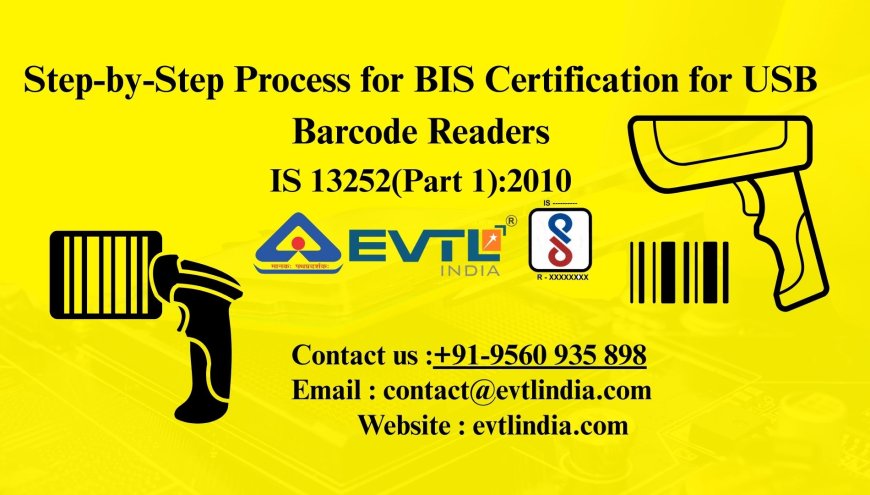Step-by-Step Process for BIS Certification for USB Barcode Readers
Your ultimate guide to BIS for barcode readers. Learn why BIS CRS is mandatory and how to get certified in India.

In todays fast-paced digital economy,USB Barcode Readershave become an integral part of various industries such as retail, logistics, warehousing, healthcare, and manufacturing. These compact yet powerful devices enable efficient scanning and data entry by reading barcodes and transferring information directly to a computer system via USB ports.
However, to sell or import USB barcode readers in India, manufacturers and importers must comply with certain regulatory requirementsBIS CERTIFICATION FOR USB BARCODE READERS. This comprehensive guide explains theBIS for Barcode Readers, focusing onBIS CRS for USB Barcode Readers, the applicable standardIS 13252 (Part 1):2010, and whyBIS CRS certification for USB Barcode Readersis mandatory in India.
What is BIS Certification?
BIS (Bureau of Indian Standards)is the national standards body of India, operating under the Ministry of Consumer Affairs. It is responsible for maintaining the quality, safety, and reliability of products by formulating Indian Standards (IS) and issuing certifications to ensure conformity.
TheCompulsory Registration Scheme (CRS)was introduced by the Ministry of Electronics and Information Technology (MeitY) in 2012. Under this scheme, certain electronic and IT productsincludingUSB Barcode Readersmust be registered with BIS before they can be imported, sold, or distributed in the Indian market.
Why is BIS Certification Required for USB Barcode Readers?
BIS certification for USB barcode readers is alegal mandateaimed at:
-
Ensuring product safety for end-users
-
Preventing the sale of substandard or unsafe products
-
Promoting quality control and uniformity
-
Simplifying product traceability and accountability
-
Enhancing consumer confidence and trust
If a barcode reader product falls under the notified list of electronic items, itmust comply with BIS standards. Non-compliance can lead to confiscation, penalties, and business losses.
Applicable Indian Standard IS 13252 (Part 1):2010
USB barcode readers are categorized underInformation Technology Equipment, and hence, the relevant Indian Standard is:
IS 13252 (Part 1):2010
"Informatio Technology Equipment Safety General Requirements"
This standard corresponds with the international standard IEC 60950-1 and defines various electrical and safety requirements that must be met by USB barcode readers and similar IT devices. Compliance with this standard ensures:
-
Protection against electric shock
-
Resistance to fire hazards
-
Safe operation during use
-
Proper insulation and grounding
All products submitted for BIS CRS certification are tested in accordance with this standard at a BIS-recognized testing laboratory.
Devices Covered under This Standard
The following types of barcode readers typically require BIS certification under IS 13252(Part 1):2010:
-
Wired USB barcode readers
-
Handheld barcode scanners with USB interface
-
Desktop barcode readers with USB connectivity
-
1D and 2D USB barcode readers
Note: Wireless barcode readers using Bluetooth or Wi-Fi may fall under additional regulatory frameworks.
BIS CRS for USB Barcode Readers Step-by-Step Certification Process
Heres a detailed look at theBIS CRS certification for USB barcode readers:
Product Testing
-
Send your product to aBIS-recognized laboratoryin India for testing underIS 13252(Part 1):2010.
-
Testing is performed to verify electrical safety, structural integrity, material compliance, etc.
-
The lab issues atest reportvalid for 90 days.
Documentation Preparation
Prepare and submit the following documents:
-
Factory Registration Certificate
-
Product manual and technical specification sheet
-
Brand Authorization Letter (if applicable)
-
Copy of Trademark Registration
-
BIS test report from approved lab
-
Address proof and ID of manufacturer
-
Undertaking & affidavit
Online Application on BIS Portal
-
Visit the and create an account.
-
Submit the application form along with all required documents and test reports.
-
Pay the prescribed application fees online.
Evaluation & Registration Grant
-
BIS officials verify the application and may request clarifications.
-
If approved, BIS issues theRegistration Certificatewith aunique R-number.
Marking and Labeling
Once registered, the product must carry theBIS standard markand registration number on:
-
Product body or label
-
Outer packaging
-
User manual (if applicable)
Renewal and Compliance
-
The certificate is valid for2 yearsand can be renewed thereafter.
-
Manufacturers must maintain quality consistency and may be subject to factory audits or surveillance.
Benefits of BIS CRS Certification for USB Barcode Readers
Complying withBIS CRS for USB Barcode Readersoffers a range of benefits:
Legal Compliance
Avoid penalties, import restrictions, or product confiscation by ensuring your products are certified before market entry.
Enhanced Market Credibility
BIS certification signals that your product is tested, safe, and meets national standards, boosting consumer and distributor confidence.
Faster Customs Clearance
Certified products enjoy quicker processing at Indian ports and are less likely to face delays due to compliance issues.
Eligibility for E-commerce Listing
Major online platforms like Amazon, Flipkart, and others require BIS-certified products for listings, especially in electronics.
Competitive Advantage
Being BIS-certified helps in winning government tenders, supply contracts, and retail distribution opportunities.
Common Mistakes to Avoid During BIS Certification
Avoid these common errors to ensure smooth certification:
-
Submitting expired test reports (valid only for 90 days)
-
Incomplete or inaccurate documentation
-
Wrong IS standard selection
-
Delayed response to BIS queries
-
Using non-BIS-approved test labs
Challenges in BIS for Barcode Readers How to Overcome Them
While the process is straightforward, applicants may face the following issues:
| Challenge | Solution |
|---|---|
| Lack of BIS knowledge | Hire an experienced BIS consultant |
| Delay in testing | Choose a lab with a shorter turnaround time |
| Trademark ownership issues | Get proper authorization letters or NOC from brand owner |
| Miscommunication with BIS | Maintain regular follow-ups and professional communication |
Penalties for Non-Compliance
If you import, sell, or distribute USB barcode readers in Indiawithout BIS CRS certification, you may face:
-
Product seizure by customs or BIS officials
-
Heavy fines under the BIS Act, 2016
-
Cancellation of business license
-
Blacklisting by government buyers or distributors
-
Lawsuits and legal action by consumers or regulators
How toIdentify a BIS-Certified USB Barcode Reader?
To ensure youre buying or distributing a BIS-compliant device:
-
Look for theBIS standard markwith the registration number (R-number)
-
Verify the registration status on the official
-
Confirm that the model number and brand match the registered product list
Who Needs BIS Certification for USB Barcode Readers?
The following stakeholders must ensure BIS compliance:
-
Manufacturers (Domestic or Overseas): Must certify every model they produce for the Indian market.
-
Importers & Traders: Must ensure the sourced product has BIS registration.
-
Retailers & E-commerce Sellers: Can only sell certified barcode readers.
-
Government Suppliers: Must supply BIS-compliant products for tenders and procurement.
Cost and Time Involved in BIS Certification
-
Testing Fees: INR 25,00040,000 (varies by lab and product)
-
Application Fees: INR 2,0005,000 (as per BIS norms)
-
Consultancy Fees: If you hire a BIS agent, charges may vary.
-
Timeframe: 1530 working days from testing to final registration.
Conclusion
BIS certification is aBIS for Barcode Readersfor importing, selling, or manufacturingUSB barcode readersin India. By complying withIS 13252 (Part 1):2010under theBIS CRS scheme, businesses can ensure electrical safety, legal compliance, improved market access, and enhanced brand credibility. Whether you're a manufacturer looking to enter the Indian market or an importer sourcing products for domestic distribution, it is essential to obtainBIS CRS certification for USB Barcode Readersto avoid legal complications and build consumer trust.
Faqs
1. Is BIS certification mandatory for USB barcode readers in India?
Yes, BIS certification is mandatory for USB barcode readers under the Compulsory Registration Scheme (CRS) by MeitY. Products must comply withIS 13252(Part 1):2010before being sold or imported in India.
2. What is the applicable BIS standard for USB barcode readers?
The relevant Indian Standard isIS 13252 (Part 1):2010, which outlines the general safety requirements for information technology equipment, including USB barcode readers.
3. How can a manufacturer apply for BIS CRS certification for USB barcode readers?
Manufacturers need to test their products in a BIS-recognized lab, submit the required documents and test reports on the BIS CRS portal, and obtain the registration certificate before product launch.
4. What are the penalties for selling USB barcode readers without BIS certification in India?
Selling non-certified products can lead to legal actions such as fines, product seizure, and bans under the BIS Act, 2016. Customs may also block imports of uncertified devices.
5. Who needs to apply for BIS certification the importer or the manufacturer?
The manufacturer is primarily responsible for BIS certification. However, Indian importers must ensure that the overseas manufacturer has obtained BIS CRS certification before importing the products.








































